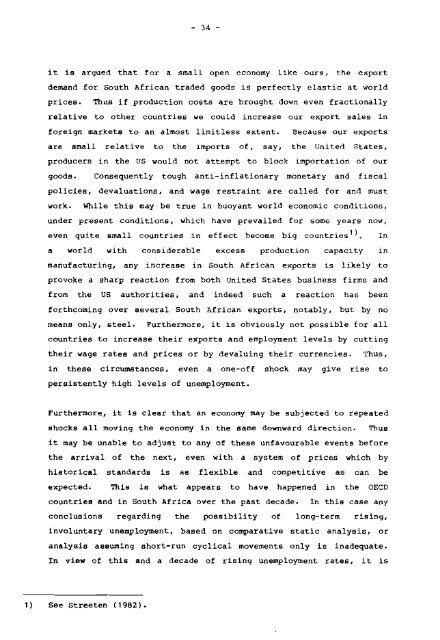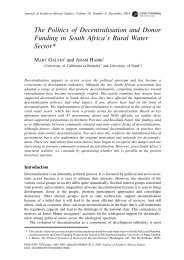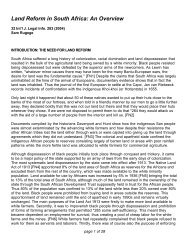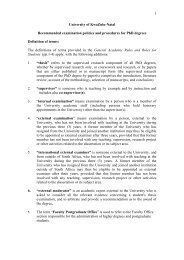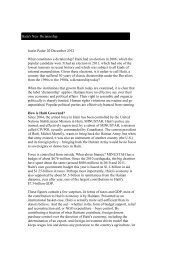Bell, Trevor : Unemployment in South Africa
Bell, Trevor : Unemployment in South Africa
Bell, Trevor : Unemployment in South Africa
You also want an ePaper? Increase the reach of your titles
YUMPU automatically turns print PDFs into web optimized ePapers that Google loves.
it is argued that for a small open economy like ours, the export<br />
demand for <strong>South</strong> <strong>Africa</strong>n traded goods is perfectly elastic at world<br />
prices. Thus if production costs are brought down even fractionally<br />
relative to other countries we could <strong>in</strong>crease our export sales <strong>in</strong><br />
foreign marketa to an almost limitless extent. Because our exports<br />
are small relative to the imports of, say, the United States,<br />
producers <strong>in</strong> the CIS would not attempt to block importation of our<br />
goods Consequently tough anti-<strong>in</strong>flationary monetary and fiscal<br />
policies, devaluations, and wage restra<strong>in</strong>t are called for and must.<br />
work. While this may be true <strong>in</strong> buoyant world economic conditions,<br />
under present conditions, which have prevailed for some years now,<br />
even quite small countries <strong>in</strong> effect become big countries". In<br />
a world with considerable excess production capacity <strong>in</strong><br />
manufactur<strong>in</strong>g, any <strong>in</strong>crease <strong>in</strong> <strong>South</strong> <strong>Africa</strong>n exports is likely to<br />
provoke a sharp reaction from both United States bus<strong>in</strong>ess firms and<br />
from the US authorities, and <strong>in</strong>deed such a reaction has been<br />
forthcom<strong>in</strong>g over several <strong>South</strong> <strong>Africa</strong>n exports, notably, but by no<br />
means only, steel. Furthermore, it is obviously not possible for all<br />
countries to <strong>in</strong>crease their exports and employment levels by cutt<strong>in</strong>g<br />
their wage ratea and prices or by devalu<strong>in</strong>g their currencies. Thus,<br />
<strong>in</strong> these circumstances, even a one-off shock may give rise to<br />
persistently high levels of unemployment.<br />
Furthermore, it is clear that an economy may be subjected to repeated<br />
shocks all mov<strong>in</strong>g the economy <strong>in</strong> the same downward direction. Thus<br />
it may be unable to adjust to any of these unfavourable events before<br />
the arrival of the next, even with a system of prices which by<br />
historical standards is as flexible and competitive as can be<br />
expected. This is what appears to have happened <strong>in</strong> the OECD<br />
countries and <strong>in</strong> <strong>South</strong> <strong>Africa</strong> over the past decade. In this case any<br />
conclusions regard<strong>in</strong>g the possibility of long-term ris<strong>in</strong>g,<br />
<strong>in</strong>voluntary unemployment, based on comparative static analysis, or<br />
analysis aaaum<strong>in</strong>g short-run cyclical movements only is <strong>in</strong>adequate.<br />
In view of this and a decade of ris<strong>in</strong>g unemployment rates, it is<br />
1) See Streeten (1982).


